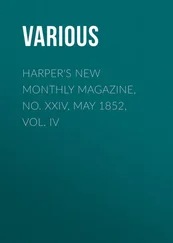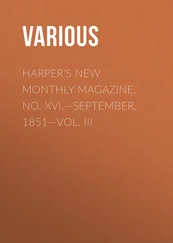Various - Harper's New Monthly Magazine, No. VII, December 1850, Vol. II
Здесь есть возможность читать онлайн «Various - Harper's New Monthly Magazine, No. VII, December 1850, Vol. II» — ознакомительный отрывок электронной книги совершенно бесплатно, а после прочтения отрывка купить полную версию. В некоторых случаях можно слушать аудио, скачать через торрент в формате fb2 и присутствует краткое содержание. Издательство: Иностранный паблик, Жанр: periodic, foreign_edu, на английском языке. Описание произведения, (предисловие) а так же отзывы посетителей доступны на портале библиотеки ЛибКат.
- Название:Harper's New Monthly Magazine, No. VII, December 1850, Vol. II
- Автор:
- Издательство:Иностранный паблик
- Жанр:
- Год:неизвестен
- ISBN:нет данных
- Рейтинг книги:4 / 5. Голосов: 1
-
Избранное:Добавить в избранное
- Отзывы:
-
Ваша оценка:
- 80
- 1
- 2
- 3
- 4
- 5
Harper's New Monthly Magazine, No. VII, December 1850, Vol. II: краткое содержание, описание и аннотация
Предлагаем к чтению аннотацию, описание, краткое содержание или предисловие (зависит от того, что написал сам автор книги «Harper's New Monthly Magazine, No. VII, December 1850, Vol. II»). Если вы не нашли необходимую информацию о книге — напишите в комментариях, мы постараемся отыскать её.
Harper's New Monthly Magazine, No. VII, December 1850, Vol. II — читать онлайн ознакомительный отрывок
Ниже представлен текст книги, разбитый по страницам. Система сохранения места последней прочитанной страницы, позволяет с удобством читать онлайн бесплатно книгу «Harper's New Monthly Magazine, No. VII, December 1850, Vol. II», без необходимости каждый раз заново искать на чём Вы остановились. Поставьте закладку, и сможете в любой момент перейти на страницу, на которой закончили чтение.
Интервал:
Закладка:
"My dame Joan" also performed another charitable service for her luckless liege lord, by bringing some warm water to bathe his galled and travel-soiled feet. Colonel Carlis pulled off his majesty's shoes, which were full of gravel, and his wet stockings, and there being no other shoes that would fit the royal fugitive, the good wife rendered these still more stiff and uncomfortable, in her zeal to dry them, by putting hot embers in them while the colonel was washing his master's feet.
When his majesty was thus refreshed, they all united in persuading him to go back into the wood, having great reason to apprehend that the roundhead troopers, who were then hunting the country round with blood-hounds, on a keen scent for their prey, would come and search Boscobel House. Humphrey Penderel, the miller, had been to Shefnal the day before, to pay some military imposts to the roundhead Captain Broadwaye, at whose house he encountered one of Cromwell's colonels, who had just been dispatched from Worcester in quest of the king. This man, having learned that the king had been at Whiteladies, and that Humphrey dwelt in that immediate neighborhood, examined him strictly, and laid before him both the penalty of concealing the royal fugitive "which," he said, "was death without mercy, and the reward for discovering him, which should be a thousand pounds ready money."
Neither threats nor bribes could overcome the loyal integrity of the stout-hearted miller, who pleaded ignorance so successfully that he was dismissed, and hastening, to Boscobel, brought the alarming tidings of the vicinity of the soldiers, and the price that had been set on his majesty's head.
The danger of his remaining in Boscobel House being considered imminent, it was determined by the faithful brothers to conceal the king and Colonel Carlis, whose life was in no less danger than that of his master, in a thick spreading oak. Having made choice of one which appeared to afford the greatest facility for concealment, they assisted the king and Colonel Carlis to ascend it, brought them such provisions as they could get, and a cushion for the king to sit on. In this unsuspected retreat they passed the day. The king having gone through much fatigue, and taken little or no rest for several nights, was so completely worn out, that having placed himself in a reclining position, with his head resting on Colonel Carlis's knee, he fell asleep, and slumbered away some hours – the colonel being careful to preserve him from falling.
Pope's popular, but long suppressed line, always makes me think that he must have been familiar with the following incident which my father's mother, Elizabeth Cotterel, who was the grand-daughter of a cadet of the old loyal family of that name, in Staffordshire, and maternally descended from one of the honest Penderel brothers, was accustomed to relate as a fact, derived from family tradition, connected with the perils and hair-breadth escapes of Charles II., at Boscobel.
"Angels who watched the royal oak so well,"
"The roundhead troopers," she said, "having tracked the king, first to Whiteladies, and then to Boscobel Forest, were led, by the keen scent of their bloodhounds, just at the twilight hour, to the very tree in which he and Colonel Carlis were hidden. The traitors, a sergeant and five others of the same company, made a halt under the Royal Oak, and began to reconnoiter it, while their dogs came baying and barking round about the trunk. Suddenly the leaves began to rustle, and one of the villains cried out,
"'Hallo! some one is surely hidden here! – look how the branches shake.'
"'It will be worth a thousand pounds to us if it be the young king,' said another.
"Then the sergeant asked 'who would volunteer to ascend the tree, and earn a larger share of the reward by taking the supposed prize alive;' but, as no one appeared willing to risk the chance of encountering a clapperclawing from the royal lion, dealt from a vantage height, he was just giving the word for them to fire a volley into the tree, 'when, by the grace of God,'" the old lady would add, with impressive solemnity, "a white owl flew out from the thickest covert of the branches and screeched 'fie upon them!' as well she might; whereupon the false traitors hooted out a curse as bitter as that of Meroz on the poor bird, and growled to each other 'that it was she that had misled their dogs, and had stirred the leaves withal, to mock themselves; howsomever, they would have a shot at her, to teach her better manners than to screech at the soldiers of the Lord.' But though five of the sorry knaves banged off their musketoons at the harmless bird, not one of them was marksman enough to hit a feather of her. Lastly, the sergeant took out a printed copy of the proclamation, promising 'the reward of a thousand pounds for the apprehension of the young man, Charles Stuart, eldest son of the late King Charles,' and fastened it on the trunk of the royal oak where his majesty was sitting in the branches above them, hearing all they said, and an eye-witness of their treason."
The breathless interest which this oral chronicle was wont to excite among juvenile loyalists of the third generation may be imagined, but the old lady had another tradition, of yet more thrilling import, engraven on the tablets of her memory, "derived, like the first," as she declared, "from those who could well vouch for its authenticity." As it forms a curious sequel to the other, and is really too good to be lost, I take leave to relate it, without expecting my readers to put the same degree of faith in my grandmother's traditionary lore as I have always been dutifully accustomed to do.
"The roundhead sergeant and his comrades, after they had retired from the vicinity of the royal oak, proceeded to Hobbal Grange, to refresh themselves at the expense of Richard Penderel, where, finding his wife alone, rocking the cradle of her infant boy, who was not well and very fractious, they, after she had brought out the best perry and mead the house afforded began to cross-question her about the king's previous appearance at Whiteladies, and, as they had done by her brother-in-law, Humphrey Penderel, to ply her with alternate threats and temptations, in order to induce her to discover any thing she might have learned on the subject. The amount of the reward for the apprehension of the royal fugitive had hitherto been concealed by Richard from his wife, probably from the painful consciousness of her weak point. At any rate, she heard it now with astonished ears, and the sergeant, in confirmation of his statement, displayed one of the printed copies of the proclamation to that effect. 'A thousand pounds! – a sum beyond her powers of calculation! The price of blood! – what then? Some one would earn it, why should not she?' She held parley with her besetting sin, and her desire of 'the accursed thing' grew stronger. At that moment her husband appeared, followed by the disguised king, who, cramped and exhausted with sitting so many hours in the tree, was coming to her hearth to warm and refresh himself, unconscious what unwelcome guests were already in possession of the Grange. The young wife hastened to Richard Penderel, showed him the paper, and whispered —
"'What is the king to us? A thousand pounds would make our fortunes.'
"'I'll cleave thy skull next moment, woman, an' thou dost,' was Richard Penderel's stern rejoinder, grasping his wood-ax with a significant gesture.
"He spoke in a tone which, though so low as to be audible to no other ear than hers, thrilled every vein in her body with terror. She knew he was a man who never broke his word, and she trembled lest the suspicions of the sergeant and his gang should have been excited by the emotions betrayed by her husband and herself during their brief passionate conference. She glanced at them, and saw they were watching her husband and scrutinizing the disguised king, who, yielding to the force of habit, had forgot his assumed character of Richard's serving-man so far as to seat himself uninvited on the only unoccupied stool in the room. Luckily, the cross baby, offended at the presence of so many strangers, set up his pipes, and began to scream and cry most lustily; at which Mistress Richard Penderel, affecting to be in a violent passion, snatched him out of the cradle, and thrusting him into the arms of the astonished king, on whom she bestowed a sound box on the ear at the same time, exclaimed, 'Thou lazy, good-for-naught fellow, wilt thou not so much as put out thy hand to rock the cradle? Take the boy to thee, and quiet him; he makes such a brawling, thy betters can't hear themselves speak.'
Читать дальшеИнтервал:
Закладка:
Похожие книги на «Harper's New Monthly Magazine, No. VII, December 1850, Vol. II»
Представляем Вашему вниманию похожие книги на «Harper's New Monthly Magazine, No. VII, December 1850, Vol. II» списком для выбора. Мы отобрали схожую по названию и смыслу литературу в надежде предоставить читателям больше вариантов отыскать новые, интересные, ещё непрочитанные произведения.
Обсуждение, отзывы о книге «Harper's New Monthly Magazine, No. VII, December 1850, Vol. II» и просто собственные мнения читателей. Оставьте ваши комментарии, напишите, что Вы думаете о произведении, его смысле или главных героях. Укажите что конкретно понравилось, а что нет, и почему Вы так считаете.












